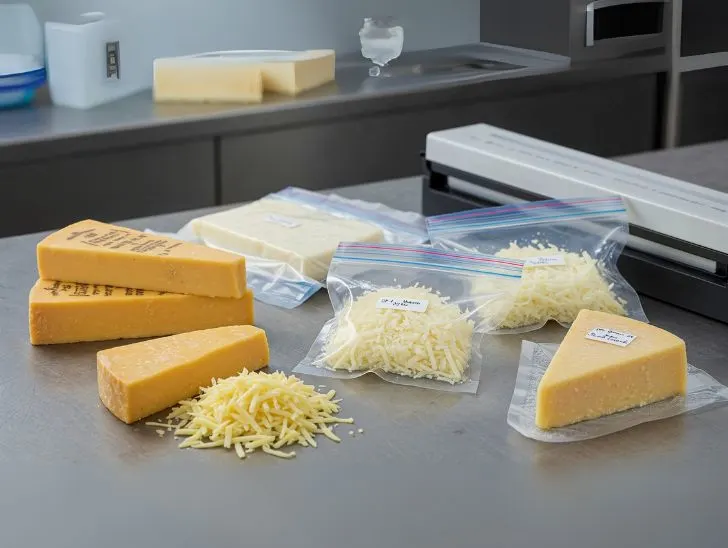Managing restaurants and public companies is not just about serving great food but also about making smart decisions behind the scenes. From increasing supplier costs to unpredictable customer flows, each kitchen choice is important.
Cheese is one of the daily ingredients that can quietly affect your margins. Because storing and controlling the cheese can have real meaning, whether it needs to be placed in the pasta or whether it must be melted in the sauce and placed in the sandwich.
That’s why so many kitchens are now asking a practical question to stretch their budgets further: Can you freeze cheese?
With the help of this blog, you will learn everything you need to know about freezing cheese frost in a commercial kitchen. And freezing cheese is often the best option, especially when combined with smart storage tips that help you save money and reduce waste.
Can Cheese Be Frozen? Here’s What UK Restaurants & Caterers Need to Know
Yes, most hard and semi-hard cheeses freeze excellently when stored properly. Cheddar, mozzarella, and Parmesan maintain quality for months when frozen using correct techniques. However, soft cheeses like brie and fresh mozzarella don’t freeze well due to their high moisture content.
Which Cheeses Can You Freeze Successfully?
As we mentioned earlier, not all cheeses respond well to freezing—but some can be frozen successfully without losing much in terms of quality. For restaurants and caterers in the UK, knowing which cheeses are held up in the freezer is essential for reducing waste, managing stock efficiently, and maintaining the standard of your dishes. The goal is to freeze cheeses that are commonly used in cooking, where minor texture changes will not be noticed.
Best Cheeses for Freezing
The best cheeses to freeze are usually hard or semi-hard varieties that are cooked or melted into dishes. These include:
- Cheddar – A kitchen staple that freezes well, especially when grated.
- Parmesan – Perfect for grating and sprinkling over dishes post-thaw.
- Mozzarella (low-moisture) – Shredded mozzarella freezes well and melts beautifully in pizzas and baked dishes.
- Gouda & Edam – Semi-hard cheeses that hold up well in the freezer when cut or grated.
- Swiss or Emmental – Great for melting and commonly used in hot sandwiches or gratins.
These cheeses can be portioned, wrapped tightly, and stored in the freezer for several months without a major drop in performance or flavor—especially if used in cooked applications.
All of these cheeses are available in various formats through Pentagon Food Group, including grated, sliced, and block options — ideal for freezing in commercial kitchens. Explore our cheese selection.
Cheeses You Shouldn’t Freeze
On the other hand, soft and fresh cheeses don’t freeze well and should be avoided unless absolutely necessary. These include:
- Brie & Camembert – Their delicate, creamy textures turn grainy and watery after thawing.
- Cream Cheese – Can separate and become unappealing in texture.
- Ricotta & Cottage Cheese – High moisture content leads to separation and a watery consistency.
- Goat Cheese (fresh) – The soft and spreadable types lose their creaminess when frozen.
These cheeses are best kept refrigerated and used fresh to maintain their original taste and texture, especially if served cold or as part of a cheese board.
How to Freeze Cheese in Commercial Kitchens
Now that you know which cheeses freeze well and which ones to avoid, the next step is understanding how to freeze them properly. In a commercial kitchen, it’s not just about tossing cheese into the freezer — it’s about maintaining quality, ensuring food safety, and staying organized. Done right, freezing cheese can help you manage stock efficiently and reduce waste without compromising on flavor or consistency.
Here’s how to do it the right way:
1. Portion Before Freezing
Don’t freeze large blocks unless you plan to use them all at once. Instead, grate, slice, or cube cheese into usable portions. This makes it easier to defrost only what you need when you need it.
2. Use Proper Packaging
Air exposure is the enemy. Wrap cheese tightly in cling film, foil, or place it in vacuum-sealed bags or airtight freezer containers. This prevents freezer burn and stops the cheese from absorbing other smells.
3. Label Everything Clearly
Always label the packaging with the type of cheese, date frozen, and use-by date. Stick to a first-in, first-out (FIFO) system to avoid waste and keep things running smoothly in service.
4. Freeze Quickly, Thaw Slowly
Place cheese in the coldest part of the freezer to freeze it quickly. When it’s time to use it, thaw slowly in the fridge to reduce texture breakdown and maintain taste.
5. Use in Cooked Dishes
Thawed cheese is best used in dishes where it will be melted or blended, like pizzas, pastas, grilled sandwiches, or baked casseroles. This helps mask any minor texture changes from freezing.
Food Safety Standards for Freezing Cheese in the UK
When freezing cheese in a commercial kitchen, it’s not just about preserving quality — it’s about staying compliant with UK food safety laws. Restaurants, caterers, and food businesses are required to follow strict hygiene and temperature control standards to ensure food remains safe for consumption. Here’s what you need to know to stay within the rules and avoid any risk to your customers — or your business.
Follow FSA Temperature Guidelines for freezing cheese
- According to the Food Standards Agency (FSA), frozen food should be stored at -18°C or lower. This helps prevent the growth of harmful bacteria and keeps the product safe over time. Make sure your freezers are regularly monitored, and temperatures are recorded as part of your food safety management system (HACCP).
Label and Date All Frozen Cheese
- All cheese must be clearly labelled with the product name, freezing date, and a use-by or best-before date. This supports both traceability and a first-in, first-out (FIFO) system — reducing the risk of expired ingredients ending up in customer meals.
Avoid Refreezing Once Thawed
- Once cheese has been defrosted, it should never be refrozen. This can compromise both texture and safety, as bacteria can grow during the thawing process. Thawed cheese should be kept refrigerated and used within 24–48 hours, especially if it’s part of a ready-to-eat item.
Keep Storage Areas Clean & Organized
- Frozen cheese should be stored away from raw meat, seafood, or strong-smelling items. Regular cleaning and organized shelving reduce cross-contamination risks and maintains food quality.
How Long Can You Freeze Different Cheeses?
Once you’ve selected the right cheeses and followed proper freezing methods, the next question is: how long can you actually keep them frozen? Storing cheese for too long can affect both its taste and texture—even if it’s technically safe to eat. Knowing the ideal freezer life of each cheese helps you plan better, rotate stock efficiently, and avoid unwanted surprises in your kitchen.
Here’s a quick guide to how long different types of cheese can stay in the freezer without a noticeable drop in quality:
Hard Cheeses (e.g. Cheddar, Parmesan, Red Leicester)
- Freezer Life: Up to 6 months
- Usage Tip: Best used grated or melted in cooked dishes. They hold their texture well but may become a bit crumbly.
Semi-Hard Cheeses (e.g. Edam, Gouda, Emmental)
- Freezer Life: Up to 3–4 months
- Usage Tip: Slight texture changes may occur, but still great for melting or slicing into hot meals.
Mozzarella (Low-Moisture, Shredded)
- Freezer Life: Up to 3 months
- Usage Tip: Excellent for pizzas and baked dishes. Freeze in portioned bags for easy use.
Soft Cheeses (e.g. Brie, Camembert, Goat Cheese, Ricotta)
- Freezer Life: Not recommended
- Why? These cheeses tend to become watery, grainy, or separate after freezing. Use fresh or refrigerate only.
Processed Cheese (e.g. Cheese slices, spreads)
- Freezer Life: Up to 2 months
- Usage Tip: Texture can change slightly but works well when melted in burgers or sandwiches.
To get the best results, always freeze cheese at -18°C or lower, use airtight packaging, and label it clearly with dates. Even freezer-friendly cheese has its limits—using it within the recommended time helps you preserve flavor and avoid waste in your kitchen.
Common Mistakes to Avoid When Freezing Cheese
- By now, you’ve learned which cheeses freeze well, how to store them properly, and how long they can stay frozen. But even with the right knowledge, simple mistakes can still lead to poor results, wasted stock, or safety concerns in a busy kitchen. To help you avoid setbacks, here are some of the most common mistake restaurants and caterers make when freezing cheese — and how to prevent them.
Freezing Cheese in Large Blocks
- Large blocks freeze unevenly, take longer to thaw, and often become crumbly or dry in the middle.
Tip: Always portion cheese before freezing — whether grated, sliced, or cubed — to match your kitchen’s needs.
Using Poor or Loose Packaging
- Exposing cheese to air can lead to freezer burn, off-flavors’, or a rubbery texture.
Tip: Use airtight freezer-safe bags, cling film, or vacuum-sealed packaging to lock in freshness.
Forgetting to Label and Date
- Cheese without clear labels gets lost in storage and may stay frozen far too long.
Tip: Label everything with the cheese type, freezing date, and use-by date. Stick to FIFO (First-In, First-Out).
Freezing Unsuitable Cheeses
- Soft and fresh cheeses often don’t survive the freezer well, turning watery or grainy.
Tip: Stick to hard or semi-hard cheeses for freezing — like cheddar, parmesan, mozzarella, and gouda.
Thawing Cheese at Room Temperature
- Thawing on the counter leads to uneven defrosting and increases food safety risks.
Tip: Always thaw cheese slowly in the fridge to maintain its texture and reduce bacterial risk.
Refreezing Cheese After Thawing
- Once thawed, cheese should not be returned to the freezer — doing so can affect both taste and safety.
Tip: Only defrost what you plan to use within 1–2 days and use thawed cheese in cooked dishes when possible.
Avoiding these common mistakes will help you get the most out of your cheese stock — reducing waste, maintaining flavour, and ensuring your kitchen stays compliant with food safety standards.
Does Freezing Affect Cheese Quality and Taste?
Yes, freezing can affect the quality, texture, and taste of cheese—but how noticeable those changes are depending on the type of cheese and how it’s used after thawing. In earlier sections, we explained that hard and semi-hard cheeses like cheddar or gouda generally freeze well and are ideal for cooking. But even these can become slightly drier or crumbly over time due to moisture loss.
The real concern with freezing is texture. Soft cheeses often turn grainy or watery, while aged cheeses may lose some sharpness in flavor. However, if cheese is destined for a melted dish, like pizza, pasta, or toastier, these changes are rarely noticeable.
To reduce the impact on quality:
- Freeze only what you plan to cook with
- Use within recommended timeframes
- Store it properly in airtight packaging
- Thaw slowly in the fridge for better results
For commercial kitchens, the key takeaway is this: if used strategically, freezing cheese can save money and reduce waste without compromising your menu — if you use the right cheeses in the right way.
Final Thoughts: Freezing Cheese the Smart Way in UK Kitchens
Freezing cheese can be a smart, cost-effective way to manage stock, reduce waste, and keep your kitchen running smoothly—if it’s done right. As we’ve explored throughout this guide, not all cheeses are created equal when it comes to freezing. By choosing the right types, following safe storage practices, and avoiding common mistakes, you can preserve both quality and flavor without compromising your dishes.
For UK restaurants and caterers, it’s not just about saving money—it’s about staying consistent, compliant, and prepared. Whether you’re stocking up on cheddar for busy weekends or freezing mozzarella for pizza prep, a well-organized freezing system can support both your service and your bottom line.
So, the next time you’re bulk-buying cheese or managing surplus stock, remember the right approach; your freezer can be one of your kitchen’s most valuable tools.
FAQs
What’s the difference between freezing block cheese vs pre-shredded cheese?
Pre-shredded cheese contains anti-caking agents that actually help it freeze better and thaw more evenly than block cheese. It’s ready to use straight from frozen for pizza and pasta applications, while block cheese needs 24-48 hours thawing time.
Can you freeze cheese sauces and prepared dishes containing cheese?
Yes, but technique matters. Cool sauce completely, store in portion-sized containers with expansion room, and add a splash of milk when reheating to restore smooth texture. Cheese gratins and baked dishes freeze exceptionally well for up to 3 months.
How does freezing affect the nutritional value of cheese?
Freezing preserves nutritional content almost completely. Protein, calcium, and vitamin content remain stable, making frozen cheese just as nutritious as fresh. Only texture changes occur, not nutritional value.
What’s the cost difference between buying fresh vs frozen cheese in bulk?
UK restaurants typically save 15-25% buying fresh cheese in bulk then freezing versus purchasing pre-frozen cheese. However, pre-frozen options eliminate handling time and guarantee proper freezing techniques, making them cost-effective for high-volume operations.
How do you calculate the right freezer space for cheese inventory?
Plan for 1 cubic foot of freezer space per 25-30 pounds of cheese. For a restaurant using 50kg monthly, you’d need approximately 6-7 cubic feet dedicated freezer space for a 3-month strategic inventory.






